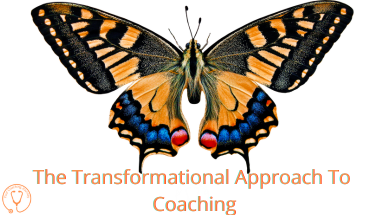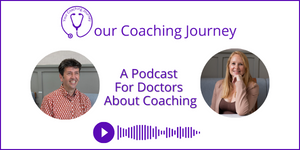What makes transformational coaching as an approach different to other approaches?
We believe that the versatility of the transformational coaching approach is what makes it different, and our preferred approach to coaching.
We’ve both done lots of coaching training in the past and seen other people that have come through different coaching training and they have one way of being in the coaching room, but if that doesn’t work, they don’t necessarily know how to flex out of it. They don’t have an alternative way to coach. If someone’s been on a coaching course they may have learned the G.R.O.W. model, which is a useful model, it’s not perfect, but it’s useful. With this model, you look at Goals, Reality, Options and Way forward.
And this is fine, as long as you get someone that presents in that way. If they don’t have a goal, what do you do then? There isn’t really the versatility in that sort of approach. We incorporate many of these approaches that I’m saying aren’t particularly flexible into the transformational coaching approach and it’s being able to move from one style of coaching into another that gives it its flexibility. Because what we need to be able to do is react to how the client is showing up in the room so that we’re flexing to what they need rather than our own agenda.
Our Approaches To Coaching
Tom says
“I’m quite a person centred coach, so I leave lots of space in my coaching. I also incorporate Gestalt into my coaching, but then I also incorporate transactional analysis, some solution focused coaching, some positive psychology, and a bit of neuroscience. There are lots of ways that I am able to be in the coaching room. I have that integrative approach to coaching myself and that’s really what transformational coaching is. We’re looking to create some transformation for the person in front of us.”
Helen says,
“I also combine person-centred, solution focussed, positive psychology, and cognitive behavioural coaching, along with some meditative practise and that idea of spirituality and what goes beyond our thinking mind.”
As you can see, both of us integrate some of the same things and some different things to make us unique as coaches.
And in terms of offering a transformational coaching approach we are looking for elements of each of those other approaches that are going to lead to some transformation for the people in front of us. That’s where the difference comes. As coaches, neither of us are particularly interested in transactional coaching; i.e. What’s your goal? What are your options? How are you going to get there? What are you going to do? And then send our clients off to do that, or not. They may achieve the goal but nothing’s really changed for them. They’ve just worked towards a goal and achieved it. There could be some transformation in that, that they’ve managed to achieve a goal they haven’t before, but the likelihood is that the next time they have a goal, they’re just back to needing some coaching. We’re really interested in bringing about some lasting transformation for the person in front of us. And that’s not to say they won’t return to coaching in the future, but they will have time and space for deeper thinking. We are looking at creating lasting change and also giving them something that allows them to feel empowered, that they could perhaps use again, so having coaching will add to the inner resources that the coachee has on an ongoing basis.
Sometimes it is about bringing about transformation in the room and having something shift in the person, in that moment with you, they get that ‘aha’ moment in the room and as a coach, you can see a shift taking place in front of you.
What Approaches Get Incorporated Into Transformational Coaching?
Note: This is a list of what we include in our Doctors’ Transformational Coaching Diploma. Other people may well have a different definition of transformational coaching, so it’s important to find out what they mean if they are using the same term.
Person-Centred Coaching: there can definitely be something transformational in offering a person centred space where you just listen and allow the person to think to the end of their thoughts. But it isn’t always. Sometimes people left to do their own thinking don’t actually come up with any new thinking at all, they just go over the old thinking that they’ve had. This approach gives you really good foundations in coaching skills: listening, playing back, leaving plenty of space, but if you are purely person-centred, it’s very difficult to flex away from that.
TOMS CODE Coaching Model: There comes a time when we perhaps want to move things on from the issue at hand, and that’s where we might introduce something like the coaching model we use and teach, TOMS CODE. Where his model differs from something like the GROW model, OSCAR, CLEAR, or any of those other coaching models, is that we’re not particularly looking for a goal at the beginning. We’re looking for what they want to talk about and later on we look for the change that they want to see. What would you like to have happen? And that, again, is the transformation, we want change. So the coachee who’s telling their story, can start to consider what they would you like to have happen, and that moves them on. It takes them away from the story and we’re suddenly into new territory and thinking about the future.
Solution-Focused Coaching: This focuses not so much on the problems and remedies, but on the desired outcomes that the person we’re working with wants to see. It’s much more future focused. It focuses on the strengths that someone has already and engaging with those and ways that perhaps they’ve used those strengths in the past that they could apply to the current problem or change. It also includes creating a future vision of where you want to head which can be really useful and generating new thinking about what options are available options. It’s very much about really getting into that generative thinking space and then taking small steps towards that ultimate change that the client wants to see.
Cognitive Behavioural Coaching: This approach supports coaches in thinking realistically about their life, their world, their behaviours, their actions and helping them to overcome limiting beliefs and that unhelpful thinking that might be getting in the way. Sometimes we have repeated patterns and beliefs that can keep tripping us up and if we start to become aware of them and then have strategies for dealing with them, that can really help. CBC can provide really useful resources for coachees to take forward in to their future, and use again when problems arise, which is important in empowering the individual, they now have some skills that when those thinking patterns or some negative thoughts return, they’ve got a strategy, a way of coping with it and working through it.
Working with metaphor: Another way of working in a transformational way is to look at metaphor and the metaphorical landscape that someone occupies. That can be really interesting in not only looking at what their metaphor is for the world they have at the moment, but also the world of the future. We talk in metaphors without even realising by the nature of our language, and sometimes it’s useful and insightful to explore our metaphors to help us understand ourselves better.
Transactional Analysis: looks at how we interact with other people and provides a framework to explore relationship dynamics with our coachees. It also explores some of the learnings and beliefs that we have that drive and motivate us.
Gestalt Approach: this helps coachees to look at relationships from different perspectives. It might be looking in on a conversation from the clock on the wall, so becoming the clock on the wall and observing a situation, or listening to a conversation that’s happening. Or you might become the other person and speak as though you’re them, and that can be really powerful in bringing about that change in the way that you see a relationship.
Embodiment and Somatics: This can really unlock something in our coachees, it’s really about reconnecting with our body and understanding that we can feel things in our body, but also that we can kind of hack our brain a little bit by reconnecting with our body and imagining what it would be like to be in the place that we want to be. So how would it feel in my body if that change was to occur? And then we can kind of try it on for size and see how it feels.
Neuroscience: As well as the body/mind connection we introduce ideas and models that can help our coachees understand themselves better, maybe, to chang the way they think about a person, a situation, or their own behaviours, and to find ways to manage themselves and move things to a more positive place.
Positive Psychology: This sits so well alongside coaching and they mirror each other in lots of ways. There are many wonderful positive psychology interventions that we can introduce to clients which are evidence-backed and contribute positively to individuals’ wellbeing, ability to find meaning and enjoyment in the world, all with the aim of flourishing in this life.
Psychology Is A Part of Everything We Do
The majority of the approaches come from a psychotherapeutic or psychology background and that’s an important element of the transformational coaching approach. We’re not too interested in management techniques and how a manager might use coaching. We’re thinking about psychology and how the person in front of us is thinking and how that thinking might change in order to unlock something and allow them to move forward. You can’t escape the psychology, you might brush over it as a manager and ignore it, but it’s there, it’s going on for the person in front of you, and for you.
Additionally if you were to solely learn about one approach, perhaps positive psychology interventions and theories and models, if you then took that into the coaching space and you had no other coaching skills, how do you deliver that? So being able to introduce positive psychology in combination with the foundational coaching skills and all of the other elements is what makes it transformational. Being able to flex between models, and approaches is what makes it transformational because you can pick up on a part of what’s going for the client, and introduce the to way of exploring it that not just informs them but draws out of them what they make of it, how they can utilise it and their answers from within.
We like to think that transformational coaching brings the best of all of those different approaches to life, we’re drawing out the bits that are really useful. We label them as what they are, whether it is a cognitive behavioural approach or a positive psychology approach. We’re not bundling stuff and calling it our own. We are presenting the different approaches and saying, actually this is really useful in bringing about transformation for the coachees in front of you and you can pick and choose what works for you, what resonates with you, but also what is going to work in the context the client’s working in.
If someone thinks, they don’t particularly resonate with that tool or that exercise or that way of coaching, they may still meet a client and think, actually, I know I didn’t resonate with that tool, but that would be really useful in this scenario and they’d have it there in that toolbox. So we love bringing all these things together and think that it really does create transformation in people.
So that’s our overview of transformational coaching and what it means for us as a coaching approach, it integrates lots of other approaches and really allows you to work with whatever comes into the coaching room in a way that perhaps specialising in one particular approach doesn’t. It gives you as a coach a great deal of flexibility.
We have podcasts and blog articles about each of the approaches mentioned in this article, and you can find out about our Doctors’ Transformational Coaching Diploma here.



